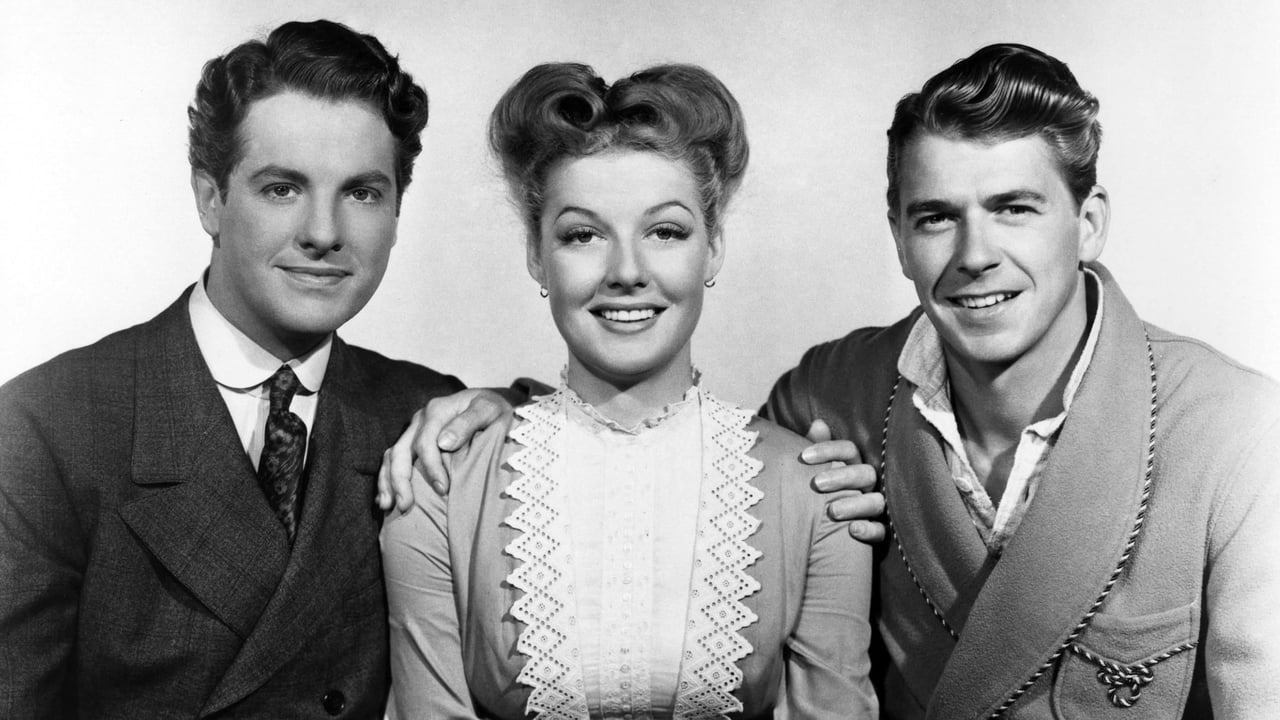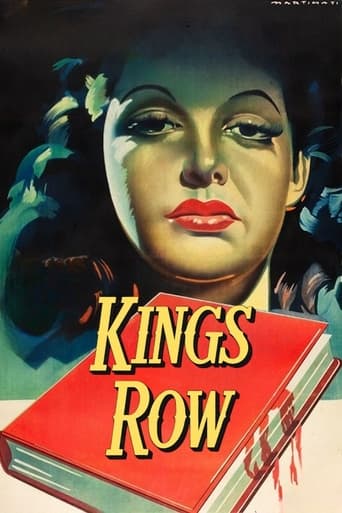

the leading man is my tpye
... View MoreSurprisingly incoherent and boring
... View MoreLet's be realistic.
... View MoreExcellent and certainly provocative... If nothing else, the film is a real conversation starter.
... View MoreThis handsome-looking soaper from Warner Bros. is the 1940s version of "Peyton Place."In the strait-laced world of early 40s Hollywood movies, some of the material in this film had to have ladies reaching for their smelling salts. Mental illness, premarital sex, a murder suicide, and, most satisfyingly lurid of all the plot lines, a doctor who performs unnecessary operations on patients as a way to punish them for their moral transgressions. Robert Cummings is boring as they come, an unfortunate quality given that he's the film's principle character and the one with whom we spend the most time. The standout, surprisingly enough, is Ronald Reagan, never known for being much of an actor, but who injects the film with the much-needed pizazz that Cummings can't muster. The actors I wanted the most of, Claude Rains and Charles Coburn, as two small-town nutjobs, are sadly given little screen time.Warner Bros. clearly spent some money on the film's production values, with production design by William Cameron Menzies, Oscar- nominated cinematography by James Wong Howe, and an oppressively nonstop score by Erich Wolfgang Korngold that set my teeth on edge and left me craving a moment of silence. In addition to its nod for James Wong Howe, the film garnered Oscar nominations for Best Picture of the year and Best Director for Sam Wood, who managed to nab three directing nominations in four years despite having no discernible style.Grade: B
... View MoreSam Wood directed this turn-of-the-century drama that stars Ronald Reagan as Drake McHugh, an amiable young man who plans on becoming a businessman as soon as he comes into his full inheritance; in the meantime, he is also a ladies man...Robert Cummings plays Parris Mitchell, who plans on becoming a doctor, though is in love with Cassandra Tower(played by Betty Field) who lives with her reclusive father(played by Claude Rains) whose fates will be tragic... Ann Sheridan plays their mutual friend Randy Monaghan, who is in love with Drake, and will be invaluable to him when tragedy strikes... Fine acting and interesting plot in this memorable film, based on a successful novel.Features the famous "Where's The Rest Of Me!?" scene with Ronald Reagan, the future 40th U.S. President.
... View MoreAlthough this is a real melodrama, with its share of implausibilities--Parris is such a good-y-goody, Randy is too tailored, coiffed and well-scrubbed to be living in hardscrabble poverty--I enjoyed this movie for its mystery and complex plot.It left me wondering about sex among unmarried couples in those days. Didn't anybody worry about becoming pregnant? When Parris and Cassie turn out the light, with Parris later showing up at Drake's place so nobody will know where he's been, we're shown clearly that Parris and Cassie have been making love. Drake's buggy rides into the country with the two "loose" sisters hint at extramarital sex. And it is clear that Randy and Drake's rides into the country include some spendour in the grass; once when she suggests they stop and get out to walk, he jumps down from the buggy like an eager puppy, which prompts her to say something along the lines of, "No, I mean really go for a walk. I know what you had in mind." One thing that seems odd is the fact that Randy gives in so quickly and easily to Drake's advances right on their first outing, while afterwards she is portrayed as such an upstanding woman, such a pillar of virtue, rather than a tramp. Another time she tells him she won't marry him, but she is perfectly willing to continue on with their current arrangement, which appears to be mostly physical. It puzzles me that, given their time and their society, they aren't roundly condemned by everyone, including Randy's family which, to the contrary, seem completely comfortable with her having an openly physical relationship with Drake. It all seems a little jarring, given, as I say, the time and place.I thought Ronald Reagan's performance in the early section, when he was devil-may-care, was quite weak. I always had the sense while watching him of an actor acting and saying lines. However, later, after Drake's fall, when he became serious, I thought Reagan's performance was far more believable, even good (which is saying a lot for Reagan). It left me with the impression that maybe the more serious performance was closer to the real man, Ronald Reagan (although it is possible that the problem was with the script as much as with the performance). In any case, I was left thinking that the figure we all saw on television, the avuncular president, equable, grinning, sure of himself in every thought and action, utterly free of doubt, was just one of Reagan's performances, a character he was playing for the camera. The real Reagan, I thought, was probably more like Drake in the later part of this movie, serious, conflicted, subject to doubt and depression, fully human. It makes sense, doesn't it--Reagan wanting to give faith and confidence to his nation by PLAYING a president giving faith and confidence to his nation.
... View MoreTwo boyhood pals from the 1890s grow into young adults with tumultuous lives: Robert Cummings is the studious kid who moves away from small town America to study psychiatry in Vienna (!), while Ronald Reagan loses all his money in a bank swindle and has to find work on the opposite side of the tracks. Intelligent, if melodramatic, adaptation of Henry Bellamann's novel isn't particularly well-directed (nor is it sharply edited, as the scenes and transitions could use more verve and snap); however, it does have Reagan at the peak of his acting charms, and his strong performance really carries this a long way. Cummings, whose make-up job causes him to resemble an actor from the silent era, is less interesting, and the supporting performances are variable, but film is still quite absorbing and entertaining. Excellent music score by Erich Korngold, handsome cinematography by James Wong Howe. Though a Best Picture nominee for 1942, the movie was originally set for release the year before, with Warner Bros. getting cold feet and putting it on ice. Once they did release it, the film failed to find much of an audience. **1/2 from ****
... View More